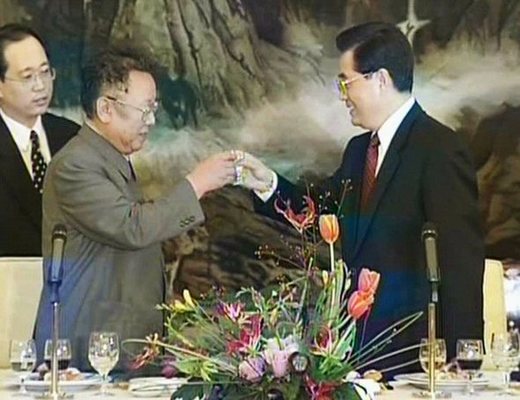 |
|
North Korea's leader Kim Jong Il and China's President Hu Jintao propose a toast to their nation's friendship in Beijing on January 18, 2006. AP Yonhap News
|
Neither side feels impetus to meet
China is intentionally cooling down its relationship with North Korea after the missile launch crisis, even contemplating a fundamental shift in its policies toward the fellow communist nation, experts said. The chances of this atmosphere developing into the suspension of Chinese food and fuel support to North Korea is slim, but it did suggest the possibility of China joining a growing international coalition in pressuring North Korea, depending on how North Korea behaves. A high-ranking Chinese government official, who is also an expert on Korean issues, said on condition of anonymity that North Korea had been refusing to listen to China since the missile launch crisis, so China is "taking a colder stance" toward North Korea, The comments were made in an interview with a Hankyoreh reporter on August 3. An official at the North Korean Embassy at Beijing, also on condition of anonymity, said that "before, China would ask for negotiation [from the North]. This time, they are not making any requests." Because of the Chinese cold shoulder turned toward the North, Pyongyang has not been willing to meet with Beijing, the official said.To the question, "What will China do if North Korea continues its hard-line policies, such as the launch of additional missiles, or nuclear tests?" the Chinese government official took a firm stand by saying, "It is not just a problem for China, but a problem for the U.N. There is no more face for China to lose because of the North Korean problems, nor responsibility to take." The official continued, "So far, China has been providing significant support to North Korea so that North Korea can maintain its status quo in the perspective of 'teeth and gum' context. However, after they launched their missile, a need to re-consider the North Korea policy has been seriously raised," he explained. He added that China is preparing for the worst by reinforcing the patron on the North Korean border. A report by Hong Kong media that China recently dispatched 2,000 additional troops to the North Korean border areas of Runjing, Hoonchon, Tumen, etc supports the Chinese officer's claims. In particular, the official mentioned 'the possibility of the collapse of North Korea.' "We are re-establishing our North Korea policy in anticipation of the worst possible scenario. [If North Korea collapses], it won't matter to us if South Korean forces position themselves south of the Yalu River," referring to the border between North Korea and China, "but if the Americans cross the cease-fire line, our forces will have to cross the Yalu River immediately," the officer said. His comment goes against analysis by some experts that says China would try to stop the collapse of North Korea by any means. A South Korean expert on China-North Korea relations confirmed the tension between the two countries. "There was an argument on the U.N. Security Council resolution between the heads of foreign affairs from the two countries at the [Association of South East Asian Nations (ASEAN) Regional Forum] in Malaysia on the 28th of last month. It seems that this turbulence has lead the Chinese to engage in more heated discussion over their North Korean policy. China will not suspend or significantly reduce its support to North Korea, but it seems they favor a 'cool-down' period for a time being," the expert said, declining to be named.






